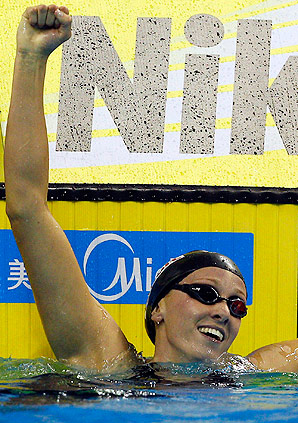
Vollmer achieves individual glory, wins U.S.' first gold at swim worlds
By coming from behind to out-touch Australia's Alicia Coutts in the 100-meter butterfly in a time of 56.87, Vollmer earned the USA's first gold medal of the 2011 World Championships. Her winning time didn't match the American record of 56.47 she set in the semifinals Sunday night, but she didn't care.
"This was absolutely amazing," she said of her first trip to the top of the podium by herself in a major international event. "To finally win in my favorite event, and to feel like I did do it individually -- it's so empowering and so exciting. Standing up there, I just couldn't stop smiling."
The star-spangled podium fanfare has been a long time coming for the 23-year-old Cal grad, whose versatility has made her a stalwart on all three relays -- she anchored the USA's silver-medal-winning 4x100 relay on Sunday night -- but may have held her back from individual success.
"It felt like I was always second," Vollmer said. "All the newbies kept coming up and they'd always be first."
Vollmer was once one of those newbies. At 12 she was the youngest competitor at the 2000 Olympic Trials, a year later she was the youngest member of the 2001 Goodwill Games team, and three years later, she was part of the gold-medal-winning 4 x 200 free relay at the 2004 Olympics in Athens. But in her individual events, the 50, 100 and 200 free and 100 fly, she never seemed to be able to break into open water and do something spectacular. At the 2008 Olympic Trials, she failed to advance out of the semifinals in three different events.
"I did wonder if I was focusing on so many events that I would never be the top in [any] event," she said.
A health issue that arose last fall forced her to narrow her focus and drop the 200 free leading up to Shanghai. Vollmer, who has battled back, shoulder and heart issues in the past, had also suffered unexplained stomach aches -- three times they were so severe she landed in the hospital -- but doctors could never identify a problem.
"I always thought it was nerves or stress or 'my stomach'," she said. Last fall she started suffering unexplained fatigue as well. "I could make it through the first hour of practice and then I fell off a cliff," she said. "I didn't have any endurance and we didn't understand why. I had so many blood tests and saw so many doctors and nobody really knew."
Vollmer tried a different tack and got in touch with Anita Nall-Richesson, the former Olympic breaststroker who is now a holistic nutritionist based in Florida. Nall-Richesson tested her for food allergies and found an allergy to eggs as well as sensitivity to gluten, dairy, tomatoes and walnuts.
"A lot of things have eggs in them, I found that out," Vollmer said.
In the spring Nall-Richesson flew out to Vollmer's home in Berkeley and took her to Whole Foods for a crash course in finding and preparing foods she can live with.
"When I'm at home, it's easy," Vollmer said. "There are tons of grains that I never heard of before, tons of different ways to cook without eggs. I learned that a fourth cup of apple sauce equals one egg if you want to bake."
As she was feeling better physically, Vollmer was also trying new things in her training. Under coach Teri McKeever she had always maintained a powerful core through exercise routines like Pilates. For the last few years she has also done strength and ocean training with coach Milt Nelms, the husband of Australian swimming legend Shane Gould.
In February Vollmer traveled to Nelms' home in Tasmania and spent two weeks with Nelms "playing in the waves," she said. "It's doing butterfly while playing in the waves, doing butterfly while catching a waves, doing butterfly against waves. It's feels so much easier when you get in a flat pool. It's like butterfly is a piece of cake."
So is diving in for relays. "Choppy water is not a scary thing for me; that's what I train in."
This week Vollmer, who is marrying former Stanford swimmer Andy Grant on Aug/ 20, has one more relay as well as the 50 fly and 100 free to swim; that is, she has at least three more opportunities to mount the top of the podium, with or without teammates.
"She's had ups and downs," McKeever said. "Getting through the disappointment of not making Beijing and knowing that you can get through that lets you know that you can get through anything."




